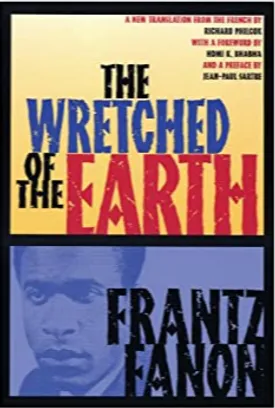The Wretched of the Earth by Frantz Fanon
The Wretched of the Earth by Frantz Fanon is an important text for anyone interested in sociology, history, or politics. It is an incisive look at how colonialism has disempowered and brutalized people of color world-wide, and serves as a rallying cry for anticolonial resistance.
The book is divided into three parts, beginning with the idea that neuroscience is necessary for the interpretation of the reality of former colonies. Fanon wrote: “We must recognize that in this domain two maladies of the soul are to be found: one of these maladies is colonizing and refers to the relationship between the colonized and the colonizers; the other malady of the soul is decolonization and refers to the psychological implications of the liberation struggle.” Here, Fanon argues that the reality of colonialism is not simply an economic and political relationship, but also an emotional and spiritual grasping of the past.
In the second part, Fanon explains that violence is both justified and necessary for the decolonization of the psyche. He wrote “The only path that is open to the native is that of profound recommencement, or else a culture which will be refashioned by a tremendous work of liberation from within.” This idea of “profound recommencement” implies that colonialism has stolen the autonomy of the people of color, and violence is the only way to regain this autonomy.
The third and final part of the book examines the role of national consciousness in liberation. In this section, Fanon uses his medical background to analyze the psychological elements of decolonization. He explains that a violence struggle is necessary to build a shared identity, enabling former colonies to understand themselves in a new light. He wrote “A national culture is not an invention or a work of art, but a complex of habits, conduits of tradition, and behavior patterns which have slowly and painfully embraced by a people in the course of its history.”
The Wretched of the Earth has remained a seminal text in critical theory and anticolonial studies since its original publication in 1961. It has been cited for its pioneering exploration of topics like violence as a tool for liberation, and its contribution to anticolonial thought. It has been used as a rallying cry for recent liberation movements like the Arab Spring, and continues to stand as an important pillar of postcolonial discourse.
At its core, The Wretched of the Earth is a passionate call to arms against the subjugation of people of color worldwide. It outlines the psychological and physical implications of colonialism and offers a manual of decolonization. Through it, Fanon invites us to reflect on our own roles in the ongoing struggle for a world free of oppression.

